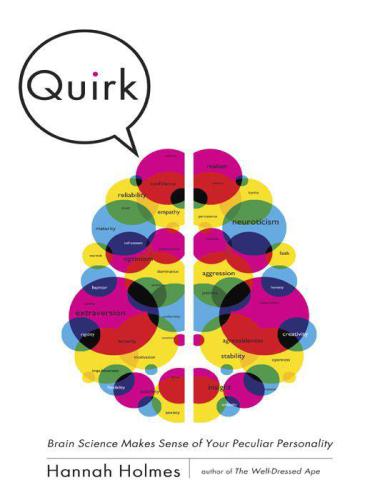
Quirk
Brain Science Makes Sense of Your Peculiar Personality
کتاب های مرتبط
- اطلاعات
- نقد و بررسی
- دیدگاه کاربران
نقد و بررسی

December 20, 2010
The contours of the human soul emerge from the scamperings of mutant rodents in this sprightly exposition of the biological roots of behavior. Science journalist Holmes (The Well-Dressed Ape) tours neurology and psychology labs the world over where genetically engineered mice, rats, and voles explore mazes; survive shocks, dunkings, and being hung upside down by their tails; get hooked on cocaine and have their brains probed for chemicals. Amid their ordeals, Holmes contends, they display rudimentary, pint-sized versions of human personality traits like anxiety, cheerfulness, altruism, self-discipline, and even artsiness. Holmes links their travails to deft explorations of the latest research into human psychology and makes insightful firsthand observations of specific personalities, from her own shy neuroticism to her husband's impulsive extroversion and scientists' quivering dread of animal rights "terrorists." The author's take is relentlessly mechanistic: personality, in her view, is largely the product of genes, governed by the involuntary action of hormones and neurotransmitters, and explained by potted speculations about evolutionary advantages that are interesting if not always convincing. Fortunately, her tart reductionism ("Spark, schmark!... Humans have no more sacred spark in our personality than squirrels do") is softened by sympathetic reportage and whimsical humor.

December 15, 2010
Holmes (The Well-Dressed Ape: A Natural History of Myself, 2009, etc.) delves into the diversity of human personalities.
"[T]he key to personality is that there's no single solution that answers every risk," writes the author, who has shown a feisty, learned hand at decoding the brain's workings for a popular audience. Half of our personality is genetically knit into our DNA ("personality isn't personal. It's biological. It's a series of dials—Extraversion, Neuroticism, Agreeableness—each set to a different temperature"), while our environment calibrates the other half—nature and nurture. Holmes deploys the "Five Factor Model," which breaks down personality into openness, conscientiousness, extraversion, agreeableness and neuroticism, each with various facets. This model is far from a scientific tool—it describes but does not explain the function of a personality facet—but it is one of the best guides available to our natural inclinations and for identifying risks for personality disorders. The author uses a template to examine many of these facets—how they are manifested in mice, then humans, and the facets' evolutionary advantages. A relaxed, almost chummy, tone permeates the book ("Yeah, I was anxious from an early age"), which puts the reader at ease as Holmes describes neurotransmitters, brain regions and their role in personality formation. Less successful is the author's template. Too often the personality traits don't pertain to mice—"Mice are hard pressed to demonstrate every facet of Openness"; "mice don't demonstrate much in the way of intellectual style"—and because much of this material is in the realm of conjecture, anecdotes abound, which can be entertaining and illuminating—the author's scrutiny of addiction, for example—but can also be painfully obvious at times: "People with a strong imagination are able to stimulate their minds from within."
An intriguing but hardly groundbreaking consideration of the qualities that distinguish us.
(COPYRIGHT (2010) KIRKUS REVIEWS/NIELSEN BUSINESS MEDIA, INC. ALL RIGHTS RESERVED.)

























دیدگاه کاربران